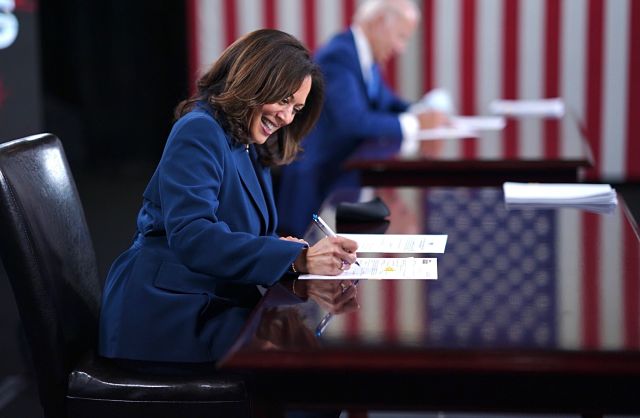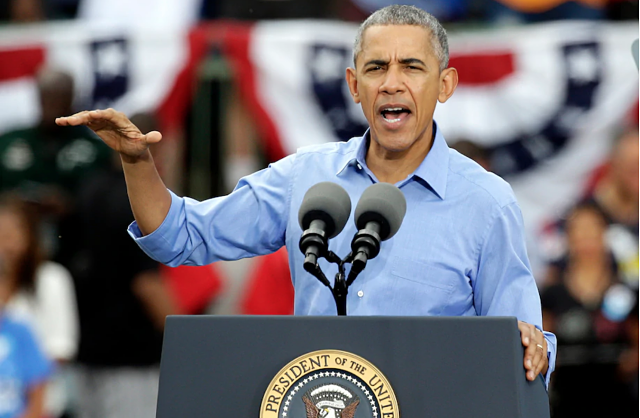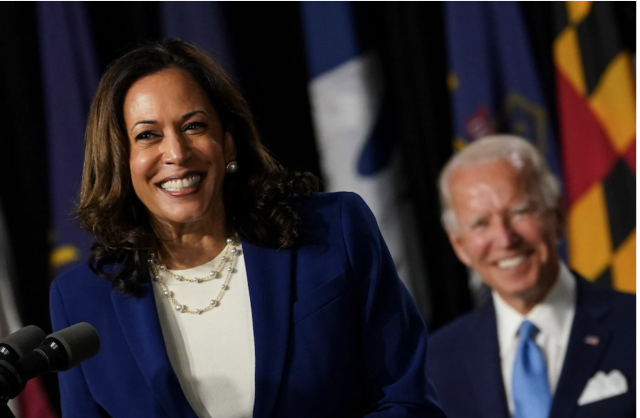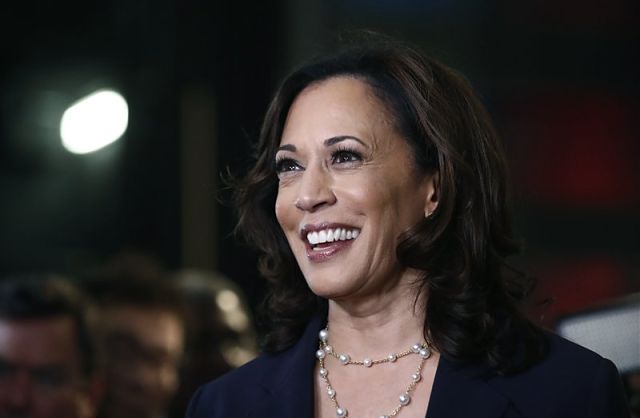 Unfortunately the male-dominated and usually misogynistic Ethiopian opposition political media in the Diaspora is already attacking Senator Kamala Harris, the U.S. vice presidential candidate, as "ሴቷ ኦባማ" (as if that's an insult) displaying their deeply ingrained prejudice against women in general and particularly against Black American women of power (see Susan Rice). Below is a recent Politico Magazine feature reflecting on the timely topic through the eyes of female political observers in the U.S. (Photo: @KamalaHarris/Twitter)
Unfortunately the male-dominated and usually misogynistic Ethiopian opposition political media in the Diaspora is already attacking Senator Kamala Harris, the U.S. vice presidential candidate, as "ሴቷ ኦባማ" (as if that's an insult) displaying their deeply ingrained prejudice against women in general and particularly against Black American women of power (see Susan Rice). Below is a recent Politico Magazine feature reflecting on the timely topic through the eyes of female political observers in the U.S. (Photo: @KamalaHarris/Twitter)
Politico Magazine
Updated: August 15th, 2020
‘She May Very Well Hold the Key to Biden’s Win’: Women have appeared on presidential tickets before—in 1984, 2008 and 2016. Is anything different this time? 17 women weigh in.
Will it be different this time?
Female vice presidential candidates appeared on major party tickets in 1984 and 2008, and in 2016, a woman headed the ticket. Each time, headlines heralded the historic choice; each time, for any number of reasons, the ticket lost. Those races also gave us a window into how women running for executive office are treated in the U.S.: The candidates were more likely than men to be questioned about their spouses; their attire and looks often became a part of the story; they had to make extra effort to show they were “tough” enough to serve.
Now that Senator Kamala Harris has become the third female VP candidate on a major-party ticket in history, Politico Magazine asked some smart female political observers to tell us: How will things be different for this VP choice, for this woman, and for this race? Or has nothing changed at all? Here’s what they had to say.
***
‘Her demeanor, her delivery, and her personal life will be under the same microscope’
Treva Lindsey is associate professor of women’s, gender and sexuality Studies at the Ohio State University.
Without question, sexism, patriarchy and misogyny remain intractable forces in electoral politics. Leading up to the announcement of Senator Kamala Harris as the vice presidential candidate, rumors circulated regarding concerns about her ambition and assertiveness. As a Black and South Asian American woman, Harris endured and will continue to confront racialized forms of misogyny rooted in white supremacy. The global pandemic coupled with the national uprising prompted by the killing of George Floyd offers a distinct context, however, in which responses to her candidacy will unfold. While many potential voters may offer legitimate critiques of Harris, the media as well as many of her political opponents have already shown their willingness to engage sexist stereotypes to discredit the junior senator from California. The combination of racism and sexism will be palpable through Election Day—even if transmitted on less obvious frequencies.
Her attire may not receive the scrutiny Secretary Hillary Clinton’s did, but her demeanor, her delivery, and her personal life will be under the same microscope as other women who ran for executive offices. Commentary about her personality and her likability will comprise an excessive amount of the conversation around her candidacy. As a woman of color, the interconnected weight of racism and sexism will undergird reactions to her speeches, her debate style, and how she engages both her allies and adversaries. The reality is that 44 of the 45 presidents of the United States have been white men. Senator Harris will be treading familiar ground with sexism and misogyny, her identity as a woman of color means unprecedented challenges await. She will encounter both familiar and particular obstacles. Her candidacy will magnify the contours of the ceiling yet to be broken.
—
Obama Accuses Trump Administration of Plot to Suppress Mail-in Votes

Former president Barack Obama accused the Trump administration of trying to suppress votes by sabotaging the U.S. Postal Service, the latest in an escalating battle over the integrity of the upcoming election. (TWP)
The Washington Post
Updated: August 14th, 2020
Former president Barack Obama accused the Trump administration of trying to suppress votes by sabotaging the U.S. Postal Service, the latest in an escalating battle over the integrity of the upcoming election.
“Everyone depends on the USPS. Seniors for their Social Security, veterans for their prescriptions, small businesses trying to keep their doors open,” Obama wrote Friday on Twitter. “They can’t be collateral damage for an administration more concerned with suppressing the vote than suppressing a virus.”
Obama linked to a podcast interview he did with his former campaign manager David Plouffe, in which he criticized President Trump’s management of the pandemic and praised former vice president Joe Biden for his selection of Sen. Kamala D. Harris (D-Calif.) as a running mate.
“Kamala is somebody I’ve known for years. She is smart. She is tough,” Obama said in an interview with Plouffe’s “Campaign HQ” podcast. “She is somebody who I think will be able to share the stage with Mike Pence, or whoever else, and dissect some of the terrible decisions that have been made over the last four years that have helped create worse problems than were necessary in the midst of this pandemic.”
Obama cited a combination of factors he believed should encourage voters to turn out in large numbers to vote in the weeks leading up Nov. 3, including fears that the Trump administration and Republicans would try to undermine the voting process because of a “consuming hatred of government.” Still, Obama warned that record turnout was not a given.
“The one thing we can control is voting,” he said. “We can cast our ballots like we never have before. And I do think maybe there’s one aspect of this that I should probably address, and that is voting among young people, in particular.”
Citing traditionally low turnout among younger voters, Obama encouraged young people to increase their level of participation by voting early and volunteering to work at polling places during the pandemic.
—
Biden and Harris Come Out Swinging

Presumptive Democratic presidential nominee Joe Biden and vice-presidential candidate Kamala D. Harris take the stage Wednesday at a campaign event in Wilmington, Del., their first joint appearance since Biden named Harris as his running mate. (The Washington Post)
The Washington Post
Updated: August 13, 2020
Biden formally introduces Harris as the Democratic ticket goes after Trump
WILMINGTON, Del. — Joe Biden and Kamala D. Harris opened a new front in the presidential campaign on Wednesday, forcefully prosecuting their case against President Trump and attempting to showcase a much different vision for the country as the Democratic ticket appeared together for the first time.
In what were perhaps the most crisp and focused speeches either has given during the presidential campaign, the new running mates defined how they will pursue the general election: with a sharp focus on what they cast as Trump’s inadequacies, an embrace of the power of women, a call to action on climate change and a defense of the protesters who have filled America’s streets in recent months.
While Biden briefly fended off some of Trump’s recent attacks — “Whining is what Donald Trump does best — better than any president in American history” — the senator from California homed in on Trump’s competence. She said he had mishandled the coronavirus pandemic, with the result being illness, death and unemployment. She urged the nation to seize on optimism, to celebrate the immigrant experience and to simply move on from the last four years.
“America is crying out for leadership, yet we have a president who cares more about himself than the people who elected him, a president who is making every challenge we face even more difficult to solve,” Harris said, ticking off tectonic shifts in the country, including racial unrest, the shattered economy and the pandemic.
—
Biden Picks Kamala Harris as Running Mate, First Black Woman

“I have the great honor to announce that I’ve picked @KamalaHarris — a fearless fighter for the little guy, and one of the country’s finest public servants — as my running mate,” Biden tweeted. In a text message to supporters, Biden said, “Together, with you, we’re going to beat Trump.” (AP Photo)
The Associated Press
Updated: August 11th, 2020
WILMINGTON, Del. (AP) — Joe Biden named California Sen. Kamala Harris as his running mate on Tuesday, making history by selecting the first Black woman to compete on a major party’s presidential ticket and acknowledging the vital role Black voters will play in his bid to defeat President Donald Trump.
“I have the great honor to announce that I’ve picked @KamalaHarris — a fearless fighter for the little guy, and one of the country’s finest public servants — as my running mate,” Biden tweeted. In a text message to supporters, Biden said, “Together, with you, we’re going to beat Trump”
Harris and Biden plan to deliver remarks Wednesday in Wilmington.
In choosing Harris, Biden is embracing a former rival from the Democratic primary who is familiar with the unique rigor of a national campaign. Harris, a 55-year-old first-term senator, is also one of the party’s most prominent figures and quickly became a top contender for the No. 2 spot after her own White House campaign ended.
Harris joins Biden in the 2020 race at a moment of unprecedented national crisis. The coronavirus pandemic has claimed the lives of more than 150,000 people in the U.S., far more than the toll experienced in other countries. Business closures and disruptions resulting from the pandemic have caused an economic collapse. Unrest, meanwhile, has emerged across the country as Americans protest racism and police brutality.
Trump’s uneven handling of the crises has given Biden an opening, and he enters the fall campaign in strong position against the president. In adding Harris to the ticket, he can point to her relatively centrist record on issues such as health care and her background in law enforcement in the nation’s largest state.
Harris’ record as California attorney general and district attorney in San Francisco was heavily scrutinized during the Democratic primary and turned off some liberals and younger Black voters who saw her as out of step on issues of systemic racism in the legal system and police brutality. She tried to strike a balance on these issues, declaring herself a “progressive prosecutor” who backs law enforcement reforms.
Biden, who spent eight years as President Barack Obama’s vice president, has spent months weighing who would fill that same role in his White House. He pledged in March to select a woman as his vice president, easing frustration among Democrats that the presidential race would center on two white men in their 70s.
Biden’s search was expansive, including Massachusetts Sen. Elizabeth Warren, a leading progressive, Florida Rep. Val Demings, whose impeachment prosecution of Trump won plaudits, California Rep. Karen Bass, who leads the Congressional Black Caucus, former Obama national security adviser Susan Rice and Atlanta Mayor Keisha Lance Bottoms, whose passionate response to unrest in her city garnered national attention.
Rice congratulated Harris on her selection, calling her a “tenacious and trailblazing leader.” Rice said she would support Biden and Harris “with all my energy and commitment.”
Bass tweeted, “@KamalaHarris is a great choice for Vice President. Her tenacious pursuit of justice and relentless advocacy for the people is what is needed right now.”
A woman has never served as president or vice president in the United States. Two women have been nominated as running mates on major party tickets: Democrat Geraldine Ferraro in 1984 and Republican Sarah Palin in 2008. Their party lost in the general election.
The vice presidential pick carries increased significance this year. If elected, Biden would be 78 when he’s inaugurated in January, the oldest man to ever assume the presidency. He’s spoken of himself as a transitional figure and hasn’t fully committed to seeking a second term in 2024. If he declines to do so, his running mate would likely become a front-runner for the nomination that year.
Born in Oakland to a Jamaican father and Indian mother, Harris won her first election in 2003 when she became San Francisco’s district attorney. In the role, she created a reentry program for low-level drug offenders and cracked down on student truancy.
She was elected California’s attorney general in 2010, the first woman and Black person to hold the job, and focused on issues including the foreclosure crisis. She declined to defend the state’s Proposition 8, which banned same-sex marriage and was later overturned by the U.S. Supreme Court.
As her national profile grew, Harris built a reputation around her work as a prosecutor. After being elected to the Senate in 2016, she quickly gained attention for her assertive questioning of Trump administration officials during congressional hearings. In one memorable moment last year, Harris tripped up Attorney General William Barr when she repeatedly pressed him on whether Trump or other White House officials pressured him to investigate certain people.
Harris launched her presidential campaign in early 2019 with the slogan “Kamala Harris For the People,” a reference to her courtroom work. She was one of the highest-profile contenders in a crowded Democratic primary and attracted 20,000 people to her first campaign rally in Oakland.
But the early promise of her campaign eventually faded. Her law enforcement background prompted skepticism from some progressives, and she struggled to land on a consistent message that resonated with voters. Facing fundraising problems, Harris abruptly withdrew from the race in December 2019, two months before the first votes of the primary were cast.
One of Harris’ standout moments of her presidential campaign came at the expense of Biden. During a debate, Harris said Biden made “very hurtful” comments about his past work with segregationist senators and slammed his opposition to busing as schools began to integrate in the 1970s.
“There was a little girl in California who was a part of the second class to integrate her public schools, and she was bused to school every day,” she said. “And that little girl was me.”
Shaken by the attack, Biden called her comments “a mischaracterization of my position.”
The exchange resurfaced recently one of Biden’s closest friends and a co-chair of his vice presidential vetting committee, former Connecticut Sen. Chris Dodd, still harbors concerns about the debate and that Harris hadn’t expressed regret. The comments attributed to Dodd and first reported by Politico drew condemnation, especially from influential Democratic women who said Harris was being held to a standard that wouldn’t apply to a man running for president.
Some Biden confidants said Harris’ campaign attack did irritate the former vice president, who had a friendly relationship with her. Harris was also close with Biden’s late son, Beau, who served as Delaware attorney general while she held the same post in California.
But Biden and Harris have since returned to a warm relationship.
“Joe has empathy, he has a proven track record of leadership and more than ever before we need a president of the United States who understands who the people are, sees them where they are, and has a genuine desire to help and knows how to fight to get us where we need to be,” Harris said at an event for Biden earlier this summer.
At the same event, she bluntly attacked Trump, labeling him a “drug pusher” for his promotion of the malaria drug hydroxychloroquine as a treatment for the coronavirus, which has not been proved to be an effective treatment and may even be more harmful. After Trump tweeted “when the looting starts, the shooting starts” in response to protests about the death of George Floyd, a Black man, in police custody, Harris said his remarks “yet again show what racism looks like.”
Harris has taken a tougher stand on policing since Floyd’s killing. She co-sponsored legislation in June that would ban police from using chokeholds and no-knock warrants, set a national use-of-force standard and create a national police misconduct registry, among other things. It would also reform the qualified immunity system that shields officers from liability.
The list included practices Harris did not vocally fight to reform while leading California’s Department of Justice. Although she required DOJ officers to wear body cameras, she did not support legislation mandating it statewide. And while she now wants independent investigations of police shootings, she didn’t support a 2015 California bill that would have required her office to take on such cases.
“We made progress, but clearly we are not at the place yet as a country where we need to be and California is no exception,” she told The Associated Press recently. But the national focus on racial injustice now shows “there’s no reason that we have to continue to wait.”
—
Related:
This Woman Could Become 1st Female U.S. President
Interview With Addisu Demissie: Senior Adviser to Joe Biden
Biden Selects Yohannes Abraham as Member of Transition Team
Interview: Helen Amelga, California Senate Field Rep & Founder of Ethiopian Democratic Club of LA
Biden Announces Plans to Invest Billions in Black-Owned Businesses (UPDATE)
100 Days Out From Election Day: Michelle Obama Makes Voter Registration Push
Election in the Time of The Pandemic: Report on Absentee Voting in U.S
Join the conversation on Twitter and Facebook.

























